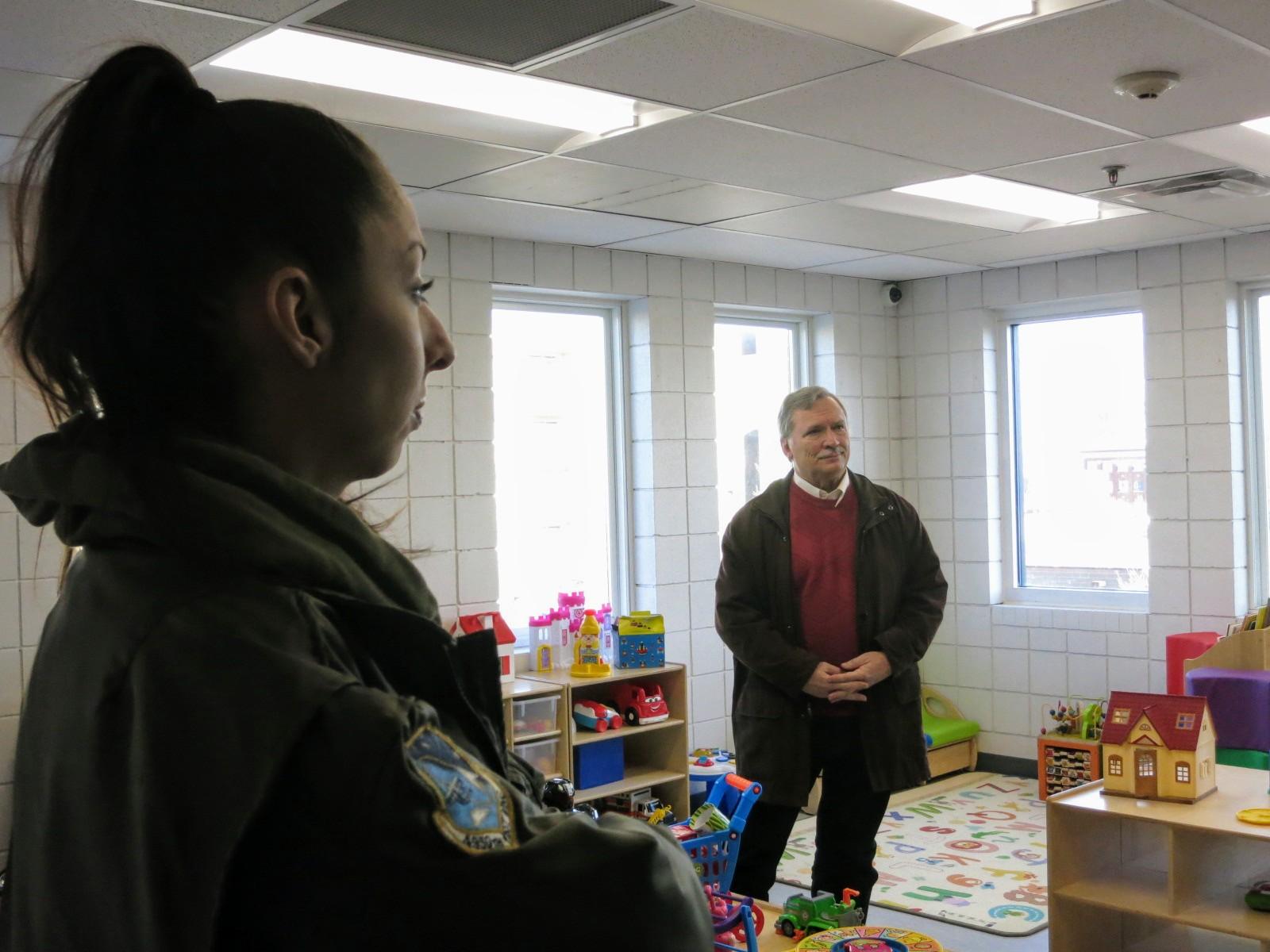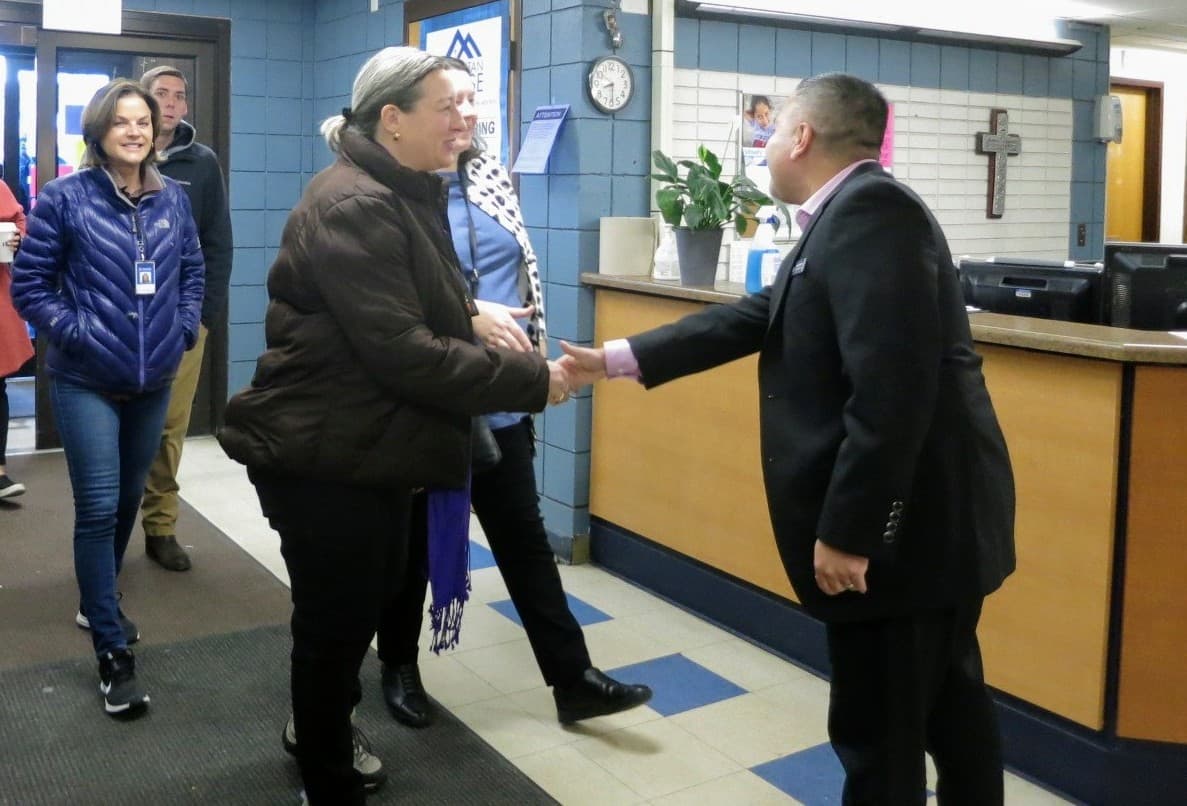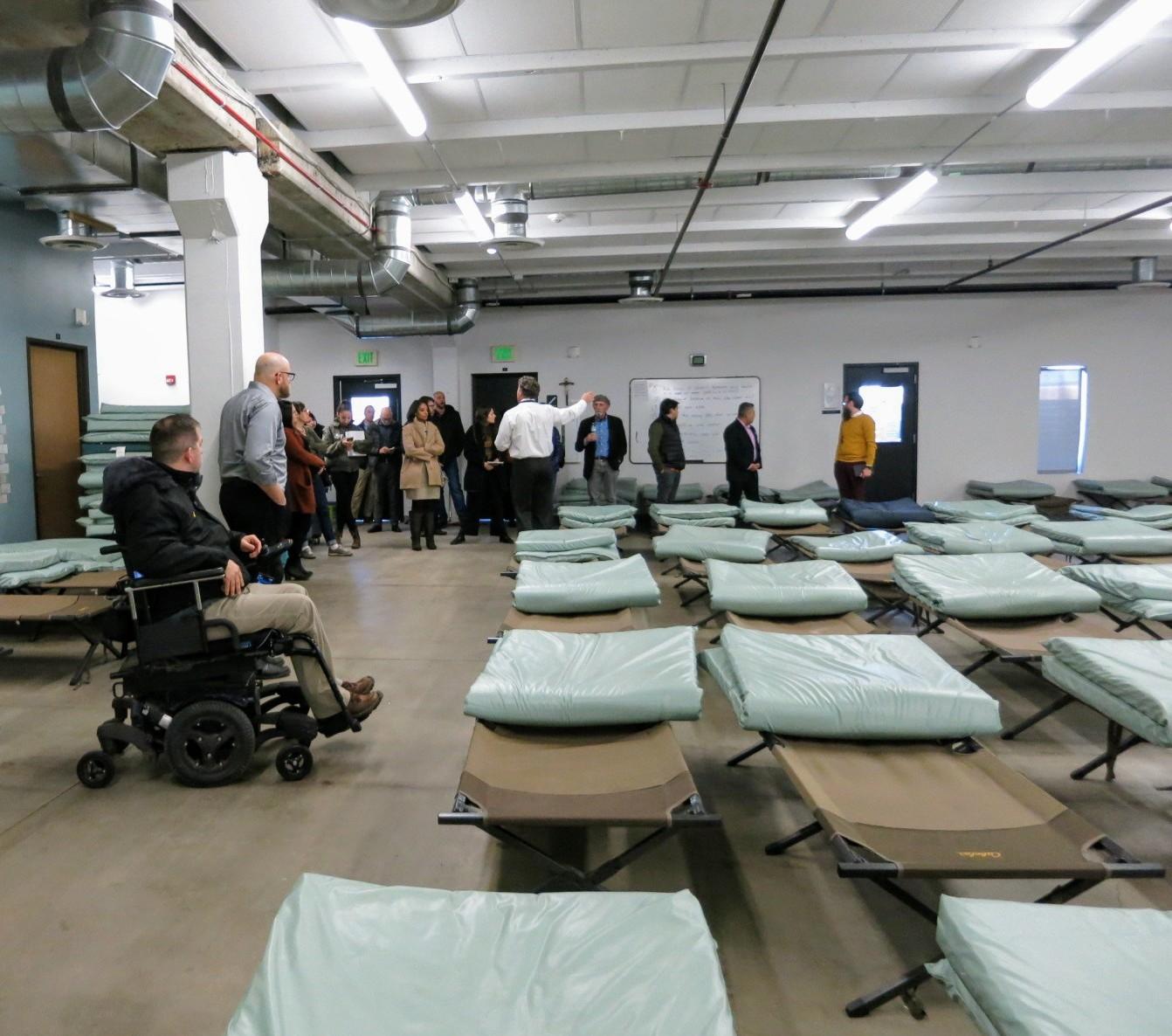Councilman Chris Hinds wasn't able to make it up the Denver Rescue Mission stairs.
The District 10 representative who uses a wheelchair and other council members spent a day visiting nine Denver shelters -- and getting a virtual tour of a tenth that is currently being created.
Council approved more than $5 million in contracts last month with the Denver Rescue mission and several other service providers aimed at improving shelter infrastructure and services -- and all but two council members spent time touring facilities where the money would be going last Thursday.
They saw some places where support for people experiencing homelessness falls short, and some of what providers are doing to improve.
In a city where the cost of housing has risen much more quickly than incomes, a judge ruled last month that because Denver's shelters are inadequate, a ban on urban camping violates constitutional protections -- specifically protections against cruel and unusual punishment. The ban outlaws on public property such activities as eating, sleeping or storing belongings while sheltering with tents, tarps or blankets.
Denver County Judge Johnny Barajas cited trial testimony he had heard that among those with "limited access to adequate shelter" are individuals with serious mental illness, unaccompanied young people and workers on swing shifts who needed a police escort to secure a bed "because of shelter curfews."
Here's what council members saw last week.
Councilman Kevin Flynn noted that he and his colleagues saw during their tour no accommodation for couples or people with pets, and little for families. Councilman Paul Kashmann, who chairs the council's Safety, Housing, Education, & Homelessness Committee -- and who had spearheaded the tour -- said Thursday that Denver was at the beginning of a three-year shelter restructuring. The effort, Kashmann said, would lead to more people being served and "a far more dignified approach to housing."
Denver Rescue Mission is set to receive a total of $2.3 million of the funding approved last month.
The Denver Rescue Mission plans to expand health and other services during the day, install an elevator and make additional renovations at the brick building at 1130 Park Ave. West that the faith-based nonprofit has been operating as a shelter since 1970.
"We're pretty excited about" the elevator, said Brad Meuli, Denver Rescue Mission's president and CEO.
Meuli spoke in a second floor room that has a variety of uses, including to accommodate men on mats when the facility's 200 beds are full. Meuli said the men's shelter now has only a freight elevator that is not large enough to comply with the Americans with Disabilities Act. The planned renovations include adding a ramp out front. Currently, men in need of a place to sleep for the night who can't negotiate Denver Rescue Mission's stairs are directed to other shelters that are ADA-compliant, such as the Salvation Army's Crossroads facility. Or they stay on the streets. Hinds, who suffered a spinal cord injury in a 2008 automobile crash, waited in the bus used to ferry council members from site to site during the Denver Rescue Mission part of the tour.
Meuli told council members that service providers were working toward a larger goal of "a better way to do shelters than we have in the past."
"We're very interested in trying to move people out of experiencing homelessness," Meuli said.
Denver Rescue Mission will use some of the new city money to expand its Next Step program in which participants have 24-hour access to beds, lockers, a community room and laundry room as they work with case managers on plans for moving to permanent housing. Denver Rescue Mission hopes to serve more than 1,100 in the program next year.
Next Step served some 700 men last year, and Denver Rescue Mission officials said Thursday that more than half of those had not returned to the shelter system. While the officials could not say how many had found permanent housing, they said people returning to shelters is a phenomenon they are able to track that indicates whether their efforts are succeeding.
Lindi Sinton, Volunteers of America's vice president for program operations, said her nonprofit also was focused on moving people from shelter to permanent housing.
Volunteers of America received $528,405 in the new batch of city contracts that it will use to provide 24-hour shelter and services for up to 25 older women and veterans who are women. The new shelter will be housed at the Bill Daniels Veterans Services Center that Volunteers of America already runs at 1247 Santa Fe Drive.
During a stop at the main existing shelter for women, run by Catholic Charities on Smith Road, Sinton showed council members photographs of the renovations underway at the Santa Fe building in preparation for opening the Volunteers of America shelter in the spring. Sinton said she hoped 150 women a year would go through the shelter and into housing, but said much of that would depend in part on the availability of housing that women on fixed incomes could afford. Older people on fixed incomes have been particularly hard hit by rising housing costs and service providers say they form an increasing segment of people experiencing homelessness.
During the tour, Councilwoman Candi CdeBaca and her chief of staff Lisa Calderón pressed shelter staff members on their commitment to "housing first," the idea that the focus should be on getting people into homes and only then on addressing their ability to, for example, to remain sober or on medication.
"Everyone deserves a home, whether they're ready or not," Calderón said.
CdeBaca, whose District 9 is home to several of the shelters she visited with the other council members on Thursday, said she also has heard complaints about conditions at some of the facilities, but did not expect to be able to explore such concerns on the tour.

Ahead of the tour, Shayannah Denney had contacted Denverite about Samaritan House, a shelter at 2301 Lawrence Street run by Catholic Charities that was the first stop on the council tour.
Denney, Community College of Denver student who wants to be an occupational therapist, said in an interview that when she, her partner and her two-year-old daughter were staying late last year in accommodations on the third floor of Samaritan House, they endured an outbreak of an upper respiratory disease. Denney raised questions about the facility's cleanliness and safety.
"It got us off the streets. I'm grateful for that," Denney said. "I just hope it gets better."
Shortly before the council members arrived at Samaritan House, Mike Sinnett, vice president of shelter services for Catholic Charities, said that he had not heard of the disease outbreak Denney described and that her sanitation concerns had not been brought to him. He said that his staff worked with residents to keep the facility clean, adding that can be a challenge given the number of people it served. He said complaints are rare.
"We take all the precautions that we can," Sinnett said.
Denney said she and her family moved last month to an income-restricted apartment she said she found with no help from Samaritan House staff. Underlying all her concerns, she said, were questions about whether people who express dissatisfaction with shelter conditions are taken seriously. She said she raised her concerns repeatedly with staff and management at Samaritan House.
Catholic Charities's Sinnett said Samaritan House has complaint processes as well as case managers who listen to residents.
"There's a lot of opportunity to voice concerns," Sinnett said.
Chris Conner, part of the staff of the city's new housing department, said internal processes such as those described by Sinnett at Catholic Charities are the first step for complaints. He said the city also received complaints. The city's public health department, Conner added, inspects each shelter about twice a year. Chris Conner's homelessness response agency, Denver's Road Home, has been incorporated into the housing department and he has a new title: homelessness resolution director.
The city in 2017 had identified safety problems involving sprinklers, exits and portable toilets at another shelter, the Salvation Army's battered Crossroads facility.
Crossroads, which was another stop on Thursday's tour, has undergone more than $300,000 in repairs and renovations in recent years, according to the Salvation Army. Last fall City Council approved a deal to pay just over $10 million for Crossroads, with the Salvation Army renting it back to run for at least three years.
The family floor at Samaritan House, which on other floors has shelter space for 126 single men and 48 single women, reopened last fall after renovations that included a reconfiguration that created four new rooms, bringing the total to 25. Even before the renovation, Samaritan House was the largest provider of family shelter in Denver. Officials said Thursday four families had moved on to permanent housing from Samaritan House in recent weeks.
Thursday, all 25 Samaritan House family rooms were occupied, sheltering a total of some 150 people.
Darren Walsh, Catholic Charities of Denver's CEO, was among several people who met council members Thursday who stressed the need not just for better shelters, but for more housing that low- and moderate-income Denverites can afford. He said Catholic Charities would like to build more housing.
"We know how to go about it, we have the energy," Walsh said. But "it's not easy to get the financial stack to make these things affordable."













